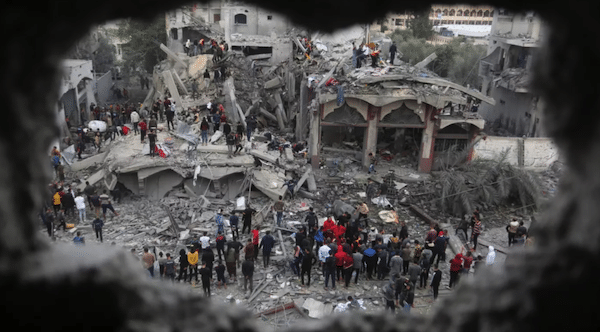A Qatar-mediated agreement between Israel and Palestinian groups is expected to halt fighting for four days, allow for the entry of aid into war-ravaged Gaza and a limited prisoner swap.
The temporary truce, confirmed by Qatar, Israel and Hamas on Wednesday, is expected to come into effect on Thursday.
A number of states and organisations, including the UAE and the Palestinian Authority, have also thanked Egyptian mediators for bringing about the deal.
Doha said the exact time the agreement would come into force would be confirmed by Wednesday evening.
Musa Abu Marzouk, a senior Hamas leader, said it would start at 10am local time (8am GMT), though there has been no confirmation from the Israeli side.
Middle East Eye breaks down what we know about the deal so far.
Cessation of hostilities
When the truce comes into effect, fighting between Israel and Palestinian groups in Gaza will come to a halt.
This will presumably mean no Israeli air strikes, no Palestinian rockets, and no street battles in Gaza.
According to Hamas, all “military actions by the occupation army throughout the Gaza Strip” will stop for the duration of the ceasefire.
Additionally, no Israeli military aircraft will fly over southern Gaza for four days, while in the north, such flights will cease only between 10am and 4pm each day.
Residents will have freedom of movement in Gaza and will not be “approached”, Hamas added.
However, movement would be facilitated “from the north to the south of the strip” only.
According to Qatar, the four-day duration of the agreement is subject to an extension.
The office of the Israeli Prime Minister said a one-day extension would be authorised for each additional 10 prisoners in Gaza released by Palestinians after the end of the initial four-day period.
However, the Israeli government has not been authorised to extend the ceasefire for longer than 10 days in total, according to an agreement among the war cabinet.
In Lebanon, sources in Hezbollah told Al Jazeera that the group was not part of the deal, but intended to join the cessation of hostilities providing Israel did the same.
Prisoner swap
As part of the agreement, Palestinian groups will release 50 prisoners held in Gaza, while Israel will release 150 Palestinians held in Israeli jails.
The Israeli prisoners are all alive, and are civilian women and children, including three who hold US citizenship. Their identities have not been confirmed.
They will be released in phases of at least 10 people a day.
The 150 Palestinian prisoners are among a list of 300 women and children, which was published by Israeli authorities early on Wednesday to give the Israeli public 24 hours to register an objection to any specific names slated for release with the High Court.
Hamas leader Khalil al-Hayya said the priority on the Palestinian side was to get those who have been in jail the longest released first.
The list includes 123 minors under the age of 18, including five who are 14 years old, according to Haaretz.
The female prisoners include Misoun Mussa and Marah Bakeer, who have been held since 2015.
They also include Hanan Abdullah Barghouthi, 59, and Samira Abd Al-Aziz Harbawi, 53.
The remaining 150 would potentially be released if Hamas can locate other civilian Israeli women and children held in Gaza and release them.
Entry of aid
Hundreds of trucks carrying aid will enter the Gaza Strip as part of the deal, after six weeks of Israeli siege and relentless bombing.
Since 7 October, no fuel and only a fraction of basic food, water and medical supplies have been allowed into Gaza from Israel and Egypt.
None of the aid that has entered so far was allowed to reach the north of Gaza.
Under the agreement, between 200-300 aid trucks will enter each day and will include fuel, according to a Hamas spokesperson. Aid will be allowed to reach northern Gaza as well as the south.
An average of 30 trucks a day have entered the Gaza Strip since 7 October, down from a daily average of 500 before the war.
Ayman Safadi, Jordan’s foreign minister, said Gaza needs 800 trucks per day, so a huge gap in aid still remains, despite the deal.

